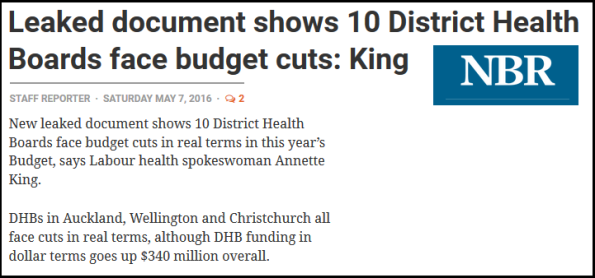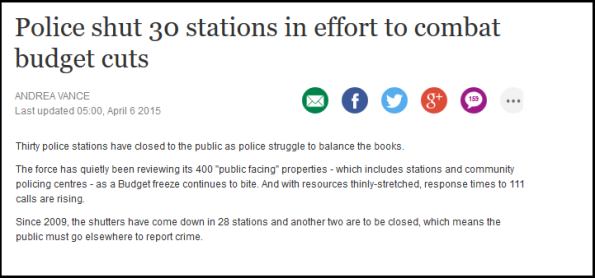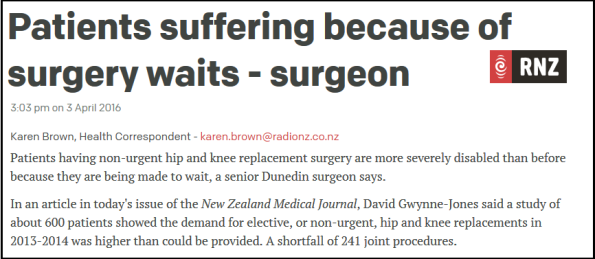Archive
The Rise of Great Leader Trump
.

.
Whatever policies Trump intends to enact during his presidential term is unknown. He has back-tracked; evaded; back-flipped; side-stepped and often contradicted himself. The most recent case-in-point was when he condemned/congratulated Americans protesting at his ascendancy to power – all within a short period of time;
.

.
The MSM is reporting that he has begun to moderate his extreme views and comments made during the bitter election campaign. He now appears to be a supporter of free trade, according to a recent Herald story.
In effect, he is becoming more ‘presidential’.
Perhaps even “mainstream”.
However, the same cannot be said of his supporters.
Whether it is the appointment of far-right businessman, media executive, and pro-Israel mouthpiece, Steve Bannon (aka, America’s version of Cameron Slater) as Trump’s ‘Chief Strategist’, or, Reince Priebus, lawyer, careerist-politician, and Chairman of the Republican National Committee, appointed as Trump’s White House Chief of Staff – there is a pronounced cabal of right-wing conservatism colonising the new administration.
Far from “draining the swamp”, as Trump has promised on numerous occasions, he is replacing it with one of his own making. As former Democratic Party candidate, Bernie Sanders pointed out;
“Mr. Trump described himself as a populist taking on the establishment, someone who would ‘drain the swamp. Unfortunately what we’re beginning to see is what I feared, which is a lot of what Mr. Trump said to get votes is not what he intends to do as president of the United States.”
In other words: same swamp, different muck.
More frightening still are comments from Trump’s other supporters. Supporters like Omarosa Manigault.
One-time contestant on Donald Trump’s “reality” TV show, ‘The Apprentice‘, Manigault was appointed as as the Trump-campaign’s director of African-American outreach in July of this year.
In August this year, on a PBS ‘Frontline‘ Election Special, Manigault uttered what must be one of the most creepiest, chilling comments in American political history;
.
.
Not since Kryptonian super-villain General Zod trashed the White House in a ‘Superman‘ movie, have such threats been uttered;
.
.
Given a chance on ABC’s ’20/20′ current affairs show to minimise her “bow down to President Trump” comment, Manigault dug the hole deeper still.
But more critically, note her passing reference to a “list of critics” which the interviewer seems not to pick up on;
.
.
Three months later, on 8 November, Manigault made this astonishing and disturbing admission to the Independent Journal Review;
“It’s so great our enemies are making themselves clear so that when we get in to the White House, we know where we stand. If [Sen. Lindsey Graham (Republican-SC)Graham] felt his interests was with that candidate, God bless him. I would never judge anybody for exercising their right to and the freedom to choose who they want. But let me just tell you, Mr. Trump has a long memory and we’re keeping a list.”
Her ordination as a minister of religion in 2012 does not appear to have mitigated her tendency to spitefulness. (Brian Tamaki would probably see her as a “kindred spirit”.)
Journalist Sunny Hostin confirmed Trump’s vindictive nature;
.
.
‘Late Show‘ host Stephen Colbert summed up the revelation of Trump’s Enemies List, saying;
“Wow, an enemies list. They went from zero to Nixon in no time flat.”
Colbert was referring to disgraced former US President, Richard Nixon. In 1973 it had been revealed during Senate hearings into the Watergate Scandal that Nixon had kept a secret Enemies List.
One of Nixon’s “enemies” was eminent journalist, the late Daniel Schorr.
.

Daniel Louis Schorr (August 31, 1916 – July 23, 2010)
.
In 2009, Schorr recounted to Jordy Yager from ‘The Hill‘;
[Schorr] has worked at CBS, The New York Times and The Christian Science Monitor, among other organizations. Though he has received three Emmys, numerous decorations from heads of state and countless journalism awards, there is one honor above all that makes Schorr beam with pride.
The distinction came during the 1973 Senate Watergate committee investigation into Nixon and his administration. In his testimony to the committee, John Dean, Nixon’s former White House counsel, mentioned that the president had kept an “Enemies List” — for those for whom the president “mean[t] some harm” and whom he did not like.
After waiting throughout the day, Schorr, who was covering the event, got his hands on the list of 20 people and began to read it live on-air.
“I got to No. 17, and I said, ‘No. 17, Daniel Schorr, a real media enemy,’ ” Schorr recalled.
“I almost collapsed on the air. I had never read it before, never seen it before, never expected it. But I continued and said, ‘No. 18, Paul Newman. No. 19, Mary McGrory [the Pulitzer Prize-winning reporter for The Washington Post].’ It was such a distinguished list,” he said, joking that the notoriety of the list made him more popular. “My lecture fees went up.”
Schorr continued to infuriate Nixon with his critical coverage and was no stranger to the president’s wrath. He is listed in the three articles of impeachment brought against Nixon. It is a badge Schorr wears with honor.
Though Schorr was dismissive of Nixon’s Enemies List, there remained the dangerous reality that a President of the most powerful nation on Earth; Commander-in-Chief of America’s armed forces; privy to information from a multitude of intelligence agencies, and access to the nuclear launch-codes – was compiling a list of personal enemies.
The Nazis had their own “Black Book“ – a list of enemies in Great Britain who were to be rounded up after the successful German invasion and occupation of that nation;
.

.
But only fascist regimes indulge in real Lists of Enemies; people who displease despots, and either end up dead, disappeared, or having “unfortunate accidents” in their lives.
Who is to say that the incoming Trump Administration is fascist?
.

.

.
Acknowledge for above images: US Government
.
.
.
References
CNet: Trump dials back anti-protest tweets
New York Times: Donald Trump Appears to Soften Stance on Immigration, but Not on Abortion
The Guardian: Donald Trump appears to soften on Obamacare and Clinton emails
NZ Herald: Trump softens tone on trade policy
The Intercept: Steve Bannon Made Breitbart a Space for Pro-Israel Writers and Anti-Semitic Readers
Wikipedia: Steve Bannon
Wikipedia: Reince Priebus
The Independent: Bernie Sanders – Donald Trump is already breaking his pledge to ‘drain the swamp’
Wikipedia: Omarosa Manigault
USA Today: Omarosa Manigault named head of black outreach for Trump campaign
The Hill: Omarosa – Critics will have to ‘bow down’ to President Trump
Youtube: Omarosa – ‘Every critic, every detractor will have to bow down to President Trump’
Youtube: Rise Before Zod, Kneel Before Zod
Youtube: Omarosa on ‘Bow Down to President Trump’ Comment
The Hill: Omarosa – Trump camp keeping list of enemies
The Grio: Reality TV star Omarosa has been ordained as ‘Rev. Manigault
Independent Journal Review: Omarosa – Republicans Who Vote Against Donald Trump Will Be Put On “A List”
Youtube: Omarosa Suggests Trump Campaign Keeping List of Enemies – The View
Youtube: The Late Show with Stephen Colbert – Trump And Obama, Sitting In DC, A-W-K-W-A-R-D
Wikipedia: Nixon’s Enemies List
The Hill: Journalist recalls the honor of being on Nixon’s Enemies List
Wikipedia: The Black Book
US Gov: Make America Great Again
Previous related blogposts
Donald Trump and the lessons of history
Dumber and dumber, scarier and scarier
When Fact Follows Fiction – The Weird World of U.S. Politics
Trump – the cultivation of demagoguery
Black Ops from the SIS and FBI?
.
.
.

.
This blogpost was first published on The Daily Blog on 20 November 2016.
.
.
= fs =
An earthquake separates John Key and ‘The Iron Lady’, Margaret Thatcher
.

.
In October 1987, British Prime Minister, Margaret Thatcher – apostle of Britain’s neo-liberal, free-market “reforms” – was famously quoted in an interview saying;
.

“And, you know, there is no such thing as society. There are individual men and women, and there are families. And no government can do anything except through people, and people must look to themselves first. It’s our duty to look after ourselves and then, also to look after our neighbour…”
.
Twenty-nine years later, as much of New Zealand is ravaged by a 7.5 earthquake, John Key makes an appeal to the people of Aotearoa on Radio NZ’s ‘Morning Report‘;
.

“The one thing I’d we’d just say to New Zealanders at the moment is stay close to your family and friends. Make sure you listen to the radio and listen to the best information that you’re getting. And if you do have certainly older neighbours or family, if you could go in and check up on them that would be most appreciated. Because there will be people feeling genuinely alone.“
.
Far from decrying Key’s sound advice, I would applaud him for giving it at a time when the country is rattled by ongoing, severe, seismic activity.
But it illustrates one fact with crystal-clarity; Thatcher was wrong. There is such a thing as ‘society’. We are our Brothers and Sisters Keepers; and functioning solely and purely for our own Individualistic and immediate Familial benefit is not to our advantage.
For without it, we are very much alone and left vulnerable to the immense, implacable, forces of nature.
Which is why the dictates of neo-liberalism – the so-called “invisible hand of the free-market” and selfish Cult of Individualism – is doomed to failure. That is why the international arm of neo-liberalism – globalisation – is being rejected from country to country.
Because at the end of the day, when this country is hit by earthquakes that tear apart our roads, bridges, offices, community facilities, factories, ports, schools, and our own homes – I don’t see the “Invisible Hand of the Free Market” coming to our assistance, “invisible” or not.
Only people, working collectively for the greater good, can achieve mutual support – quite often for no personal benefit or gain.
Defenders of the neo-liberal/free market/globalisation ideology should stop and consider; we cannot have the Primacy of the Individual in good times, and then seek sanctuary within the strength of society in bad. People acting together as a community is either within us all the time, or not at all.
It is time for the leader of New Zealand’s free-market, pro-neo-liberal, political party to understand this simple truth.
.
.
.
References
Margaret Thatcher Foundation: Woman’s Own – interview – 31 October 1987
Radio NZ: Morning Report – John Key urges New Zealanders to look out for their neighbours
.
.
.

.
This blogpost was first published on The Daily Blog on 19 November 2016.
.
.
= fs =
When Life is a Lottery
.

.
Fun Fact #1: Between 2006 and 2013, the number of homeless grew by 25%. Based on Census data; one in 100 were homeless in 2013; one in 120 in 2006, and one in 130 in 2001.
Fun Fact #2: In 1986, home ownership in New Zealand stood at 73.5%. By 2013, Census data showed home-ownership had fallen to 64.8%.
Fun Fact #3: In August this year, Auckland’s average house price reached – and passed – the $1,000,000 mark.
.
Make no mistake, housing has become a crisis in New Zealand as this May poll for a TV3/Reid Research Poll highlighted;
.

.
Even 61% of National voters accepted the new reality in our once-egalitarian nation. Housing unaffordability (for the middle classes) and homelessness (for beneficiaries and the working poor) could no longer be ignored.
Stepping back to 20 August 2007, National’s newly-elected leader, John Key, made an impassioned speech to the Auckland branch of the New Zealand Contractors Federation. In it, he excoriated the then-Clark-led Labour government;
“Over the past few years a consensus has developed in New Zealand. We are facing a severe home affordability and ownership crisis. The crisis has reached dangerous levels in recent years and looks set to get worse.
This is an issue that should concern all New Zealanders. It threatens a fundamental part of our culture, it threatens our communities and, ultimately, it threatens our economy.
The good news is that we can turn the situation around. We can deal with the fundamental issues driving the home affordability crisis. Not just with rinky-dink schemes, but with sound long-term solutions to an issue that has long-term implications for New Zealand’s economy and society.
National has a plan for doing this and we will be resolute in our commitment to the goal of ensuring more young Kiwis can aspire to buy their own home.”
Nine years later, Key’s description of New Zealand’s housing crisis has changed markedly. It is now a “challenge“, as he painfully tried to explain on TVNZ’s Breakfast programme;
“I don’t think it’s a crisis, but prices are going up too quickly. There are plenty of challenges in housing, and there have been for quite some time.”
On 9 November, a Hibiscus Coast couple were the incredibly lucky couple to win the latest multi-million dollar Lotto prize;
.

.
The Radio NZ story further reported;
The man’s wife said at first she thought her husband was joking about the win.
“My head started spinning, my heart was racing and I got the shakes.”
The couple claimed their prize at Lotto’s head office on Thursday afternoon.
“As we sat in the winner’s room, he kept turning to me and saying ‘Am I in a dream?’ and I kept turning to him and saying ‘is this real?'” the woman said.
“We’ve been busting our guts trying to buy our first home,” the winner said.
“We just went to the mortgage broker earlier this week to see what they could do to help. But they just couldn’t make anything work for us.
“We were absolutely gutted and I just said ‘maybe that ship has sailed’.
“But my wife tried to stay positive and said ‘don’t worry, something good will happen for us’.
“I don’t think either of us thought that the something good would be $44 million.”
Note what the woman said here;
“We’ve been busting our guts trying to buy our first home. We just went to the mortgage broker earlier this week to see what they could do to help. But they just couldn’t make anything work for us. We were absolutely gutted and I just said ‘maybe that ship has sailed’.”
When couples have to rely on winning Lotto to be able to afford to buy their first home, there is something seriously askew in society.
Remember Dear Leader Key’s own words;
“We are facing a severe home affordability and ownership crisis. The crisis has reached dangerous levels in recent years and looks set to get worse. This is an issue that should concern all New Zealanders. It threatens a fundamental part of our culture, it threatens our communities and, ultimately, it threatens our economy.”
In the United States, commentators from the msm, politics, dissident community; and further afield, have rapidly come to the realisation that Donald Trump’s unlikely, unforeseen, and up-till-now improbable victory in the 2016 Presidential race was predicated on the belated understanding that globalisation and neo-liberalism have left behind millions of people.
In the Voting Booths across the United States, Consumers became Citizens again, and cast their ultimate sanction against the political establishment and those who supported the neo-liberal orthodoxy. The status quo of Margaret Thatcher and Ronald Reagan (the latter, ironically a Republican like Trump) was utterly repudiated.
The disenchantment and alienation of the Working and Middle classes germinated during the 2008 Global Financial crisis and resulting Great Recession – the effects of which are still with us, eight years late. In the United States, millions of Americans lost their homes.
More than four million Americans have lost their homes since the housing bubble began bursting six years ago. An additional 3.5 million homeowners are in the foreclosure process or are so delinquent on payments that they will be soon. With 13.5 million homeowners underwater — they owe more than their home is now worth — the odds are high that many millions more will lose their homes.
Most telling was this criticism by
Housing remains the biggest impediment to economic recovery, yet Washington seems paralyzed. While the Obama administration’s housing policies have fallen short, Mitt Romney hasn’t offered any meaningful new proposals to aid distressed or underwater homeowners.
Writing for the Huffington Post a year later,
“… the vast majority of those four million lost their homes because they lost their jobs, not because they had in better times taken out mortgages that they could not afford.
[…]
It is not the rich who are being foreclosed. It is those on the margin of the core middle class. It is particularly middle class minorities who have taken the greatest hit on both their personal wealth and their associated credit scores. Falling house prices since 2008 have pulled median white net-worth down by 27 percent but median black net-worth down by anywhere between 40 percent and 53 percent.”
All the promises of neo-liberalism had come to nought. Instead millions had lost their jobs and those lucky enough found new work in low-paid service industries. Take-home pay was cut – and Humiliation applied in abundance as ‘compensation’.
The Working and Middle Classes not only lost their job and homes – their new status in low-paid work was precarious.
Events post-2008 hastened the demise of the American Dream and the rise of the Precariat, as Richard McCormack wrote, in February of this year for the Manufacturing and Technology News;
The effects on the U.S. economy caused by 30 years of offshore outsourcing of production and jobs is starting to drive major changes in the American political system. The rise of a “precariat” class of Americans — those who are living “precarious” lives — has created a populist movement that shows no sign of acquiescing to the “establishment” in both the Democratic and Republican parties.
The new precariat comprises a growing class of people who are going nowhere in their jobs, who are insecure and unstable. The group is “experiencing the breaking apart of the American Dream, which is what historically held the country together — the rise of the middle class, with everyone doing better,” notes visiting scholar John Russo of Georgetown University’s Kalmanovitz Initiative for Labor and the Working Poor. “It’s not working that way any more.”
Driving the rise of the precariat is a society that is not generating enough wealth. De-industrialization, the shift of major goods-producing industries to foreign nations, and both the Republican and Democratic establishment’s embrace of free trade, are leading to a populist uprising.
The precariat is becoming one of the largest classes of Americans, encompassing far more than blue-collar workers who have been slammed by economic forces outside of their control. It now includes millions of Americans with college degrees who are under compensated or can’t find full-time employment with benefits.
As white-collar jobs have been outsourced, Americans with more than high-school degrees are starting to see their prospects “mirror those of the working class,” says Russo. “That insecurity and instability is now part of their life. That is why this new group is not yet a class in itself. It hasn’t defined what it is going to be.”
It is fragmented, but it is big, and much of it is angry.
In his article, McCormack quotes John Russo from the Georgetown University’s Kalmanovitz Initiative for Labor and the Working Poor;
“As steady formal work has been disappearing over time, informal work began to move beyond traditional concepts such as consulting, internships, subcontracting, privatization and intermittent employment,” Russo explains. “Rather than the continued rise of the formal economy, it is the informal economy that is growing.”
The precariat is “potentially all of us united by the fear of insecurity,” he notes. It is made up of “individuals living precarious and insecure existences lacking employment security, job security, income security, skill security, occupational security and labor market security.”
This is no longer the underground economy, but includes displaced individuals from the public and private sectors, millennials dealing with mountains of student debt, and baby boomers forced into early retirement without enough savings to support themselves.
There is little public assistance for the precariat class and “they’re not making demands to get better wages or improved benefits [because they] are replaced easily,” Russo notes.
Three years after Coates’ story, and nine months after McCormack’s insightful analysis of the public mood, Trump’ ascendance as America’s 45th President was complete. Trump won the States where blue-collar workers had suffered the most.
The story of globalisation and neo-liberal “reforms” of our own economy has followed a familiar story; loss of long-term employment; ever-increasing need for re-training; the rise casualisation and contract piece-work; and the increase of lower-paid service-work.
Depressingly, economist Shamubeel Eaqub has predicted;
“The workplace is likely to be further casualised. “
Which adds further hopelessness to New Zealanders increasingly locked out of what was once known as the Great Kiwi Dream of home-ownership.
The National government ostensibly understands the notion of aspiration, as Dear Leader Key said six years ago;
“I want New Zealanders to be aspirational – to want more for themselves and their families, and to know that they have opportunities to do that.”
Those words ring hollow as National scrambles frantically to make itself “look busy”, trying to alleviate the dual crisis of worsening home ownership and homelessness.
Bennett’s suddenly-announced policy of bribing state house tenants with (up to) $5,000 was widely seen as a panic-driven, ad hoc policy. It certainly caught Finance Minister Bill English by surprise, having no forewarning of Bennett’s media announcement on the issue.
The twin tsunami-waves of homelessness and housing unaffordability appears to have utterly over-whelmed National Ministers.
As Trump’s victory in the US Presidential election has demonstrated with crystal clarity, Consumers can easily become Citizens again, re-discovering the power of their Vote. When Citizens’ anger becomes focused, and a perceived solution (or even just an opportunity to say “FUCK YOU!” to the Establishment) is put before them – they will vote for it.
Especially when they have lost so much, and have little left to lose.
Such was the case of the US presidential elections, and before that, the ‘Brexit’ Vote.
As New Zealanders become more and more conscious of how much they have lost in the last thirty years, they too, will find themselves pissed off.
The opening lines of the song from ‘Les Miserables’ – Do You Hear The People Sing? – should serve as a reminder to the political establishment in this country;
“Do you hear the people sing?
Singing the song of angry men?”
The Great Kiwi Dream of home ownership was never predicated on the long-odds offered by a little yellow piece of paper;
.

.
Home ownership should not be a Lottery.
.
.
.
References
Otago Daily Times: Homelessness increasing in NZ
Fairfax media: NZ home ownership at lowest level in more than 60 years
Radio NZ: Auckland’s average house value tops $1 million
TV3 News: Government gets thumbs down on housing
Scoop: Key – Speech to New Zealand Contractors Federation
TVNZ: Is there a housing crisis? John Key fails to say yes or no after being put on the spot
Radio NZ: Claimed – $44 million lotto prize
NY Times: The One Housing Solution Left – Mass Mortgage Refinancing
Huffington Post: America’s Half-Forgotten Housing Crisis
Manufacturing and Technology News: The Rise Of The American ‘Precariat’ – Globalization And Outsourcing Have Created A Combustible Political Culture
Chicago Tribune: How Trump won the presidential election – Revenge of working-class whites
Fairfax media: Shamubeel Eaqub – Job casualisation a global phenomenon
NZ Herald: John Key’s speech to the National Party convention
Interest.co.nz: Paula Bennett announces plan to offer $5,000 to homeless Aucklanders and state house tenants to leave Auckland
TV3 News: Govt to help fund Auckland homeless to move
Metrolyrics: Les Miserables – Do You Hear The People Sing?
Previous related blogposts
Can we do it? Bloody oath we can!
Budget 2013: State Housing and the War on Poor
Budget 2013: State Housing and the War on Poor
National recycles Housing Policy and produces good manure!
Government Minister sees history repeat – responsible for death
Housing Minister Paula Bennett continues National’s spin on rundown State Houses
Letter to the Editor – How many more children must die, Mr Key?!
National under attack – defaults to Deflection #1
National Housing propaganda – McGehan Close Revisited
Housing; broken promises, families in cars, and ideological idiocy (Part Tahi)
Housing; broken promises, families in cars, and ideological idiocy (Part Rua)
Housing; broken promises, families in cars, and ideological idiocy (Part Toru)
Another ‘Claytons’ Solution to our Housing Problem? When will NZers ever learn?
National’s blatant lies on Housing NZ dividends – The truth uncovered!
National and the Reserve Bank – at War!
.
.
.

.
This blogpost was first published on The Daily Blog on 15 November 2016.
.
.
= fs =
The seductiveness of Trumpism
.

.
The 5 percent of Americans with the highest incomes now account for 37 percent of all consumer purchases, according to the latest research from Moody’s Analytics. That should come as no surprise. Our society has become more and more unequal.
When so much income goes to the top, the middle class doesn’t have enough purchasing power to keep the economy going without sinking ever more deeply into debt — which, as we’ve seen, ends badly.
[…]
The real reason for America’s Great Regression was political. As income and wealth became more concentrated in fewer hands, American politics reverted to what Marriner S. Eccles, a former chairman of the Federal Reserve, described in the 1920s, when people “with great economic power had an undue influence in making the rules of the economic game.” With hefty campaign contributions and platoons of lobbyists and public relations spinners, America’s executive class has gained lower tax rates while resisting reforms that would spread the gains from growth.
Yet the rich are now being bitten by their own success. Those at the top would be better off with a smaller share of a rapidly growing economy than a large share of one that’s almost dead in the water. – Robert Reich, New York Times, 3 September 2011
.
“Neoliberalism as never been, and is not, a coherent set of economic principles, the presence or absence of which in any given policy prescription determines the strength or weakness of its ideological credentials. Indeed, neoliberalism, far from being some sort of neo-classical economic crusade, is what it has always been: the fearsomely coherent political project of global capitalism’s ruling elites.
Its anti-state/free market propaganda notwithstanding, neoliberalism’s purpose has always been to use the coercive power of the state to thwart and/or reverse any and all attempts to empower the many at the expense of the few.
As Professor David Harvey notes in his A Brief History of Neoliberalism:
“Redistributive effects and increasing social inequality have in fact been such a persistent feature of neoliberalisation as to be regarded as structural to the whole project. Gérard Duménil and Dominique Lévy, after careful reconstruction of the data, have concluded that neoliberalisation was from the very beginning a project to achieve the restoration of class power”.” – Chris Trotter, Bowalley Road, 30 May 2015
.
“…the share of population living in poverty is at a very high level. The latest data shows almost 15 percent of the American population of 46.7 million people living in poverty, and those numbers are even higher, if you concentrate on certain groups, particularly minority, single parents, especially female-headed families, and it is heavier for young people and those with disability.
So, with such large share of the population living below the poverty line, this has important macroeconomic issues, let alone the concern that is of a more political nature, which we will not address. But if we look at the macroeconomic impact, not only does poverty create significant social strains, it also eats into labor force participation, and undermines the ability to invest in education, to invest in health, to invest in training, and by holding back economic and social mobility it creates not only a poverty impact on this generation, but it certainly can make it more sustainable inter-generationally.” – Christine Lagarde, Managing Director, IMF, 22 June 2016
.
In America, the full impact of a neo-liberal agenda hit Kansas so harshly that comedian/commentator, Seth Meyer, was unflinching with his scathing, mocking, satire at the travesty that had resulted;
.
.
After his election in 2010, Republican Kansas state governor, Sam Brownback, made massive cuts personal and business income taxes on the neo-liberal premise that low (and in some cases, nil) taxes would result in massive job-creation and increased economic activity by local businesses.
The tax-cuts were heavily supported by right-wing billionaire Koch Brothers;
Kansas also completely erased the income tax bills for the owners of certain “small” businesses, totaling 330,000 by this year and including a host of subsidiaries of Wichita-based Koch Industries. The Koch-funded organization Americans for Prosperity helped Brownback push the bill and has remained a staunch defender of the changes.
The result was utterly predictable;
The predicted job growth from business expansions hasn’t happened, leaving the state persistently short of money. Since November, tax collections have fallen about $81 million, or 1.9 percent below the current forecast’s predictions.
[…]
Last month, Brownback ordered $17 million in immediate reductions to universities and earlier this month delayed $93 million in contributions to pensions for school teachers and community college employees. The state has also siphoned off more than $750 million from highway projects to other parts of the budget over the past two years.
School teachers, college employees, the State University, schools, poverty-programmes, medicare, and other services all faced budgetary cuts.
The business website, Bloomberg, was less than impressed;
Kansas has lagged Nebraska in job creation since 2011, and the gap has widened since late 2014. Instead of adding the 25,000 jobs a year that Brownback promised, Kansas actually lost 5,400 jobs over the 12 months ending in February.
The author, Justin Fox, made the eye-brow-raising under-statement of the year by declaring;
This doesn’t look great for Kansas.
There’s an age-old saying for such under-statements. Click here.
Little wonder that Fox headed his article; “Kansas Tried Tax Cuts. Its Neighbor Didn’t. Guess Which Worked“.
The owners/editor of Bloomberg appeared to ‘freak out’ at the prospect of publishing a story so utterly revealing of such an epic fail of neo-liberal dogma. The editor/owner posted at the bottom of Fox’s article;
This column does not necessarily reflect the opinion of the editorial board or Bloomberg LP and its owners.
Of course not. That might be embarrassing. Having to admit to the Masses that one of neo-liberalism’s main tenets is actually bullshit, is not a good look.
Even Governor Brownback’s fellow Republicans were panicking, as they faced re-election this month, and the wrath of voters;
Now many of the same Republicans who helped pass Brownback’s plan are in open revolt, refusing to help the governor cut spending so he can avoid rolling back any of his signature tax measures.
[…]
“Let him own it,” Republican Rep. Mark Hutton said. “It’s his policy that put us there.”
[…]
“We’re growing weary,” said Senate President Susan Wagle, a conservative Republican from Wichita. While GOP legislators still support low income taxes, “we’d prefer to see some real solutions coming from the governor’s office,” she said.
In an example of how Republican’s take personal responsibility, Governor Brownback told journalists who was to blame for his “real live experiment“;
“You’ve got some global issues that are going on that we have absolutely no control over.”
That’s how you take Personal Responsibility: blame others.
As Kansas is slowly bankrupted, Trump appears not to have learned from Brownback’s economic ineptness, saying;
“Under my plan, I’ll be reducing taxes tremendously, from 35 percent to 15 percent for companies, small and big businesses. That’s going to be a job creator like we haven’t seen since Ronald Reagan. It’s going to be a beautiful thing to watch. Companies will come. They will build. They will expand. New companies will start. And I look very, very much forward to doing it.” – Donald Trump
Trump’s plan to cut taxes mirrors the Republican “experiment” in Kansas. It simply remains unclear why Trump believes the results will be any different.
Meanwhile, here in New Zealand, the re-distribution of wealth up-ward, through successive tax-cuts for the richest, echoed that taking place thousands of kilometres away in a central US state.
In 2009 and 2010, National cut taxes and increased gst. (There have been seven tax cuts since 1986.) This shifted wealth up-ward to higher-income earners.
As government revenue fell, budget cuts to spending on services followed;
.
.
.
.
.
.
.
.
Even as recent tax cuts resulted in wealth re-distributed upward; wage growth remaining low or stagnant; and social services reduced – New Zealanders are still not facing the dire economic and social hardship faced by our American cousins.
In September 2011, forward-thinking American economist Robert Reich explained how a worsening economic crisis in the US was affecting the middle classes;
Some say the regressive lurch occurred because Americans lost confidence in government. But this argument has cause and effect backward. The tax revolts that thundered across America starting in the late 1970s were not so much ideological revolts against government — Americans still wanted all the government services they had before, and then some — as against paying more taxes on incomes that had stagnated. Inevitably, government services deteriorated and government deficits exploded, confirming the public’s growing cynicism about government’s doing anything right.
Some say we couldn’t have reversed the consequences of globalization and technological change. Yet the experiences of other nations, like Germany, suggest otherwise. Germany has grown faster than the United States for the last 15 years, and the gains have been more widely spread. While Americans’ average hourly pay has risen only 6 percent since 1985, adjusted for inflation, German workers’ pay has risen almost 30 percent. At the same time, the top 1 percent of German households now take home about 11 percent of all income — about the same as in 1970. And although in the last months Germany has been hit by the debt crisis of its neighbors, its unemployment is still below where it was when the financial crisis started in 2007.
How has Germany done it? Mainly by focusing like a laser on education (German math scores continue to extend their lead over American), and by maintaining strong labor unions.
THE real reason for America’s Great Regression was political. As income and wealth became more concentrated in fewer hands, American politics reverted to what Marriner S. Eccles, a former chairman of the Federal Reserve, described in the 1920s, when people “with great economic power had an undue influence in making the rules of the economic game.” With hefty campaign contributions and platoons of lobbyists and public relations spinners, America’s executive class has gained lower tax rates while resisting reforms that would spread the gains from growth.
Yet the rich are now being bitten by their own success. Those at the top would be better off with a smaller share of a rapidly growing economy than a large share of one that’s almost dead in the water.
The economy cannot possibly get out of its current doldrums without a strategy to revive the purchasing power of America’s vast middle class. The spending of the richest 5 percent alone will not lead to a virtuous cycle of more jobs and higher living standards. Nor can we rely on exports to fill the gap. It is impossible for every large economy, including the United States, to become a net exporter.
Reviving the middle class requires that we reverse the nation’s decades-long trend toward widening inequality. This is possible notwithstanding the political power of the executive class. So many people are now being hit by job losses, sagging incomes and declining home values that Americans could be mobilized.
And mobilised they have been.
Whatever one thinks of Republican presidential candidate, Donald Trump, he has tapped into the psyche of the disaffected; the disenchanted; and the dispossessed. And they are legion in number.
According to US Census Bureau, there are some 43.1 million Americans currently living in poverty – 13.5%. (The Bureau states that poverty has fallen by 3.5 million people since 2014.)
The lives of ordinary Americans is now stressed and wretched, as Australia’s ABC journalist, Elle Hardy recently reported;
When fun-loving 34-year-old George Tabor died suddenly in the town of Tifton in America’s Deep South, his family was bereft.
It confirmed again that the American Dream is a vision that’s moved beyond the reach of millions of its citizens.
George’s family struggled with the immense grief of his loss, but they were also plunged into a financial crisis, not knowing how they could fund his funeral or medical bills.
“The very first day, as we were dealing with the fact that he’s gone, the first thing that was in my mind was that all these bills were about to fall on us,” his older sister Doris Stafford, 36, said.
George and his sisters all worked. Their mother had worked her whole life too. Yet, as workers on minimum pay rates, just coping with weekly needs is an endless treadmill.
George Tabor was in goodhealthbefore he suddenly fell ill.(Supplied: Doris Stafford)Having savings to buffer sudden emergencies, or even a plan for a more secure future, is a story from Fantasyland for this family, and for up to nearly 70 per cent of Americans, according to a recent survey.
In this election year, as the anger of the marginalised and threatened has taken centre stage, it’s rocked the established verities of American political culture.
The IMF warned in June of social strains if the US fails to address soaring rates of poverty, in this richest of First World economies.
On the ground, it’s the immediate daily strains that occupy people’s minds.
George’s sister Sherry Smith, 31, began receiving George’s medical bills at the apartment they’d shared. Meanwhile, Doris was working out how to come up with $US5,100 ($6,610) for his funeral.
For workers earning about $US290 ($375) a week, the challenge is astronomical.
Robert Reich’s simple infograph (below) demonstrates convincingly that pay rose with productivity until the late ’70s /early ’80s. At that point in our global history, Thatcherism and Reaganism impacted on their respective nations, the UK and USA.
.
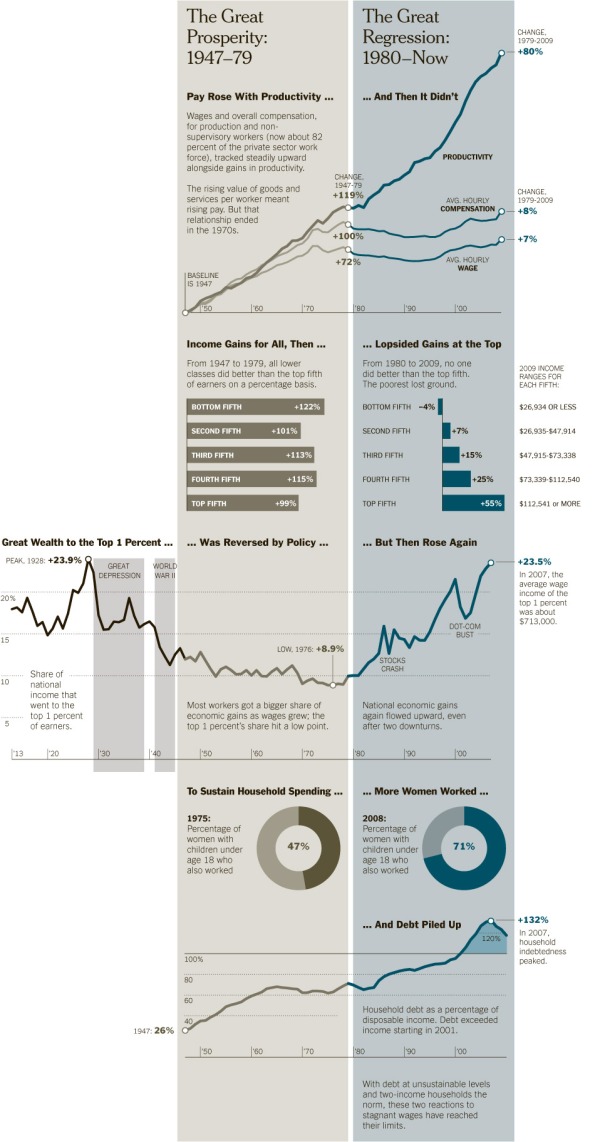
.
New Zealand followed half a decade later. We now face our own social fall-out from the introduction of neo-liberalism; high-unemployment; under-employment; unaffordable housing; low wages; student debt; growing child poverty; and a widening wealth/income gap;
In its latest survey of household wealth, Statistics New Zealand found the country’s richest individuals – those in the top 10 percent – held 60 percent of all wealth by the end of July 2015. Between 2003 and 2010, those individuals had held 55 percent.
It is little wonder that with increasing globalisation, corporations have shifted jobs to developing nations where wages are low and working conditions next-to-nil.
Western workers have lost out to their counterparts in China, India, Pakistan, Vietnam, etc.
That has meant vast swathes of US industries closing down until major cities such as Detroit – once a major economic powerhouse for the nation – went bankrupt in 2013. Millions of workers have lost their jobs or have taken lower-paid employment.
The story of George and his family continues;
If there was any mercy in George’s death, it was that when it came, it was immediate. But in the weeks leading to it, there was much that was preventable.
When a persistent cough started nagging, he put it down to smoking. When the hacking began, a doctor’s charges and medicine costs were off-putting.
Finally, coughing and unable to breathe, he asked friends to take him to hospital. Some laughed it off as another prank.
“We didn’t find out he was sick until he’d been in hospital for three days,” Doris says. “We found out on Facebook.”
George had pneumonia. As he lay in a coma, the family assumed he was insured through his job and contacted his employer. Low-wage workers rely on employer-provided health care, or they go without.
“Applebee’s said he wasn’t eligible for insurance until next January, even though he’d been working there a year and a half,” Sherry said.
Frequent visits from the hospital’s “financial people” compounded their stress.
The family believe that if George had medical insurance, the hospital would have let him stay. Tests revealed he had an abnormal swelling in a heart blood vessel. Corrective surgery was scheduled for November 1, but the hospital sent him home.
“He was sent home with no medication,” Sherry says. “He couldn’t walk, his feet were still swollen. He tried to stand and he fell over.”
Private health insurance costs thousands of dollars a year in the US. Even the much-vaunted Obamacare seems to miss its targets.
“At first I thought Obamacare would be a good idea,” Doris says. “When they told me the price, $57 a week — it was $57 I didn’t have in the first place.”
The family has always voted Democrat. But this time it’s different. With worries about jobs, and living in quiet despair, the Republican candidate is winning her over.
George Tabor’s family was not alone. There were millions of George Tabor Families throughout the United States. And they were no longer listening to the political establishment.
In a moment of prescience, Billionaire investor Warren Buffett warned;
Americans are rapidly losing faith in the ability of Congress to deal with our country’s fiscal problems. Only action that is immediate, real and very substantial will prevent that doubt from morphing into hopelessness. That feeling can create its own reality.
Buffett wrote his words in August, 2011.
Since the late 1970s, both Republican and Democrat parties have failed to address the growing threat to Middle Class stability, and to Working Class aspirations in the US. Both parties had deserted their constituents, leaving people stressed, desperate, and fearful.
The forces of globalisation/neo-liberalism/free market has robbed millions of American families of what they considered their birthright – a high standard of living unparalleled in the world, and opportunities for their children.
.
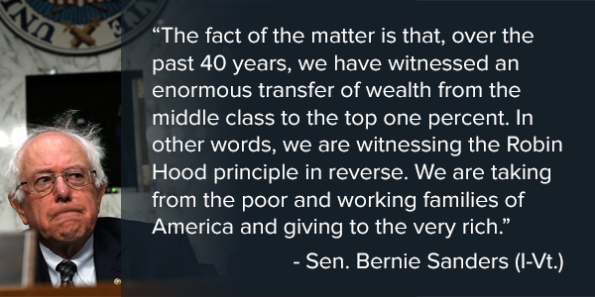
.
There was a vacuum left by the political establishment, and Donald Trump shrewdly colonised that space. Trump had created the new “reality” that Buffett warned us about.
The feeling of desperation and alienation from both Working and Middle classes is now so palpable that mainstream media are finally coming to terms with that disaffection and understand what constituted the almost-irresistable force that propelled an ego-driven, political novice to the White House.
Despite Trump being a seriously flawed, undisciplined individual who has alienated large numbers of American voters; women, blacks, Hispanics, LGBT, disabled – I think we all underestimated the anger of the Masses that Trump was feeding off.
I glimpsed a miniscule fraction of that anger last week when I watched ‘Sixty Minutes‘. A journalist was talking to five disaffected blue-collar workers in Ohio.
These were supposedly Democrat-voting, Union-loyal, workers.
But at least three openly declared their intention to vote for Trump (story starts at 25:12);
.
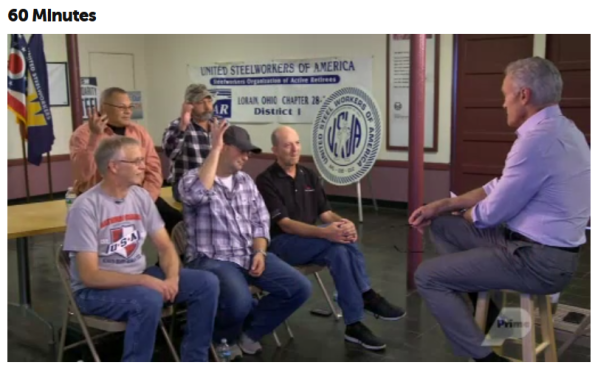
.
It was at that point that I finally understood what inexorable force was propelling a bloated billionaire to the most powerful position on this planet.
As former Republican Party operative, Mike Lofgren, wrote in September 2011;
It should have been evident to clear-eyed observers that the Republican Party is becoming less and less like a traditional political party in a representative democracy and becoming more like an apocalyptic cult, or one of the intensely ideological authoritarian parties of 20th century Europe. This trend has several implications, none of them pleasant.
[…]
What do the Democrats offer these people? Essentially nothing. Democratic Leadership Council-style “centrist” Democrats were among the biggest promoters of disastrous trade deals in the 1990s that outsourced jobs abroad: NAFTA, World Trade Organization, permanent most-favored-nation status for China. At the same time, the identity politics/lifestyle wing of the Democratic Party was seen as a too illegal immigrant-friendly by downscaled and outsourced whites.
While Democrats temporized, or even dismissed the fears of the white working class as racist or nativist, Republicans went to work.
Lofgren‘s entire piece is worthwhile reading.
So the ground was fertile for someone who would supposedly articulate the feelings of betrayal and loss for millions of disaffected, confused, resentful Americans.
People are pissed off, and they ain’t going to take it any more. They are fighting back. Like their British counter-parts during the “Bexit/EU” referendum, a considerable segment of American voters lashed out at “The Establishment”. It’s as if millions of Americans suddenly woke up, realising the supreme power of their vote.
The system could take away their jobs; their standard of living; their aspirations – but their right to vote was cast in granite-stone. Like their right to “bear arms” and casually shoot each other at whim, it was guaranteed by their Constitution.
Early last century, when Russians lashed out at the autocratic Establishment of the Russian royal family, they installed a far-left regime, the Bolsheviks.
But Americans don’t do left-wing revolutions.
When Americans revolt en-masse, they lurch to the Right.
In this case, a dangerously nationalistic, reactionary Right that is closer to the French National Front than the US Republican Party. (Though many would assert that the only real difference between the French National Front and the US Republican Party is that the latter is willing to tolerate immigrants for cheap, exploitable labour.)
Those who voted for Trump have done so for a myriad of reasons, many of which are fluid and inter-changeable. They see Trump as someone outside the political Establishment; someone who will be their champion.
But Donald Trump will not be that champion. Demogogues with simplistic answers to complex problems rarely are. History is replete with demagogues who have exploited peoples’ legitimate discontent to gain power and subsequently wreaked havoc.
If Americans think they have just elected the solution to their problems, they are sadly mistaken.
Their problems have only just begun.
Meanwhile, from a global perspective, the Left is confronted with a serious crisis of confidence: when Working Class people turn to jingoistic demagoguery for solutions, why is our message not getting through?
Perhaps that is the real crisis confronting us.
.
.
.
References
New York Times: The Limping Middle Class
International Monetary Fund (IMF): Transcript of a Press Conference on the Conclusion of the 2016 Article IV Consultation Mission with the United States
Youtube: Kansas Tax Cuts – A Closer Look
Motherjones: Trickle-Down Economics Has Ruined the Kansas Economy
The New Yorker: Covert Operations
CBS News: Kansas loses patience with Gov. Brownback’s tax cuts
Kansas City Star: Gov. Sam Brownback cuts higher education as Kansas tax receipts fall $53 million short
Bloomberg: Kansas Tried Tax Cuts. Its Neighbor Didn’t. Guess Which Worked
Democracy Now: Expanding the Debate – Jill Stein “Debates” Clinton & Trump in Democracy Now! Special – Part 1
NZ Kindergartens Inc: Funding cuts take effect
NBR: Leaked document shows 10 District Health Boards face budget cuts – King
Fairfax media: Police shut 30 stations in effort to combat budget cuts
Radio NZ: Patients suffering because of surgery waits – surgeon
NZ Family Violence Clearinghouse: Lead up to Budget 2016 – Govt announces funding cuts, increases and reprioritising
Radio NZ: Funds cut from parents-as-teachers scheme
TVNZ News: Kiwi charities and NGOs face closure with impending funding cuts
Radio NZ: Unemployment rises, wage growth subdued
ABC News:US election: Life and death in Georgia and the end of the American Dream
US Census Bureau: Income, Poverty, and Health Insurance Coverage – 2015
USA Today: Detroit becomes largest U.S. city to enter bankruptcy
Radio NZ: 10% richest Kiwis own 60% of NZ’s wealth
Truthout: Goodbye to All That – Reflections of a GOP Operative Who Left the Cult
The New York Times: Stop Coddling the Super-Rich – Warren Buffett
Prime TV: Sixty Minutes
Other Blogposts
Bowalley Road: Clever Strategy vs Desperate Tactics – Hillary Clinton Allows Donald Trump To Survive The Second Presidential Debate.
Bowalley Road: Raising Nixon’s Ghost
Bowalley Road: Why the Greater Good requires Americans to vote for the Lesser Evil – Hillary Clinton
Bowalley Road: The Better Angel: Why Birgitte Nyborg Beats Donald Trump
Gordon Campbell: on the US election home stretch
Kiwipolitico: Social origins of the Politically Absurd
No Right Turn: This is not what democracy looks like
Public Address: The Long, Strange Trip
The Daily Blog: LaQuisha St Redfern vs Donald Trump
The Daily Blog: The horror of Clinton winning vs the horror of Trump winning – voting for the lesser of two evils is still voting for evil
The Daily Blog: American Demockery
The Daily Blog: The latest Trump/Clinton machinations and why gender is the real societal fault line this election
The Daily Blog: Fear And Loathing Of A Democratic Presidency: Where To For The American Left
The Standard: Trump final campaign ad
The Standard: Donald Trump is good
The Wireless: Uncovering the art of an ugly election
Previous related blogposts
Letter to the editor – Donald Trump and the lessons of history
Dumber and dumber, scarier and scarier
When Fact Follows Fiction – The Weird World of U.S. Politics
Trump – the cultivation of demagoguery
Black Ops from the SIS and FBI?
.
.
.
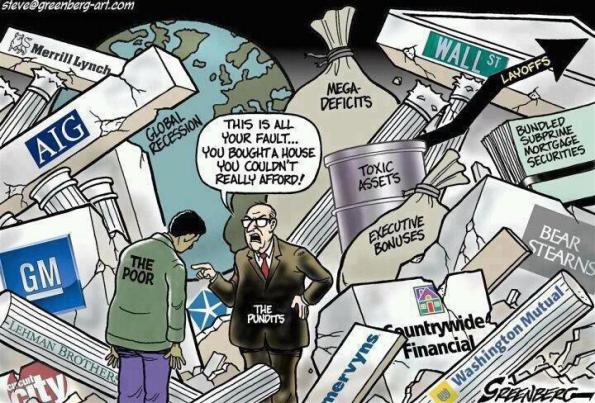
.
This blogpost was first published on The Daily Blog on 10 November 2016.
.
.
= fs =
2016 – Ongoing jobless tally and why unemployment statistics will no longer be used
.
.
Continued from: 2015 – Ongoing jobless tally
So by the numbers, for this year;
.
Events
.
January
- Gameloft: 150 redundancies
- ROA Mine: 20 redundancies
- NZ Bus: 200 redundancies (t.b.c)
February
- Fairfax media: 70 redundancies
- Prime Range Meats: 130 redundancies
- Stonewood Homes: 85 redundancies
- Dick Smith Electronics: 430 redundancies
March
- Wellington Hospital: 40 redundancies
- Solid Energy: 41 redundancies
- Bathurst Mining: 25 redundancies
- NZ Post: 500 redundancies
April
- Ministry of Justice: 100 redundancies
- Fisher & Paykel: 186 redundancies
- Cavalier Carpets: 65 redundancies
- Countdown Waihi: 41 redundancies
May
- Fuji Xerox: 40 redundancies
- General Cable: 62 redundancies
June
- Bathurst Resources Ltd: 8 redundancies
- Westport Harbour: 8 redundancies
- Holcim Cement: 105 / 150 redundancies
July
- Napier City Council: 78 redundancies
- Countdown: unknown
August
- Westpac: 72 redundancies
- Ministry of Primary Industries: 49 redundancies
- Waikato SPCA: 12 redundancies (?)
- Otago University: 20 redundancies
October
- Pumpkin Patch: 57 redundancies
- Ministry of Justice/Maori Land Court: 26 redundancies (tbc)
- BNZ: 500 redundancies (tbc)
November
- General Cable: 170 redundancies
- Lincoln University: 51 redundancies
- EQC: 400 redundancies
.
Statistics
.
This blogger previously reported how Statistics NZ recently implemented a so-called “revision” which would materially affect how unemployment stats were counted and reported;
.

.
On 29 June 2016, Statistic NZ announced that it would be changing the manner in which it defined a jobseeker;
Change: Looking at job advertisements on the internet is correctly classified as not actively seeking work. This change brings the classification in line with international standards and will make international comparability possible.
Improvement: Fewer people will be classified as actively seeking work, therefore the counts of people unemployed will be more accurate.
The statement went on to explain;
Change in key labour market estimates:
- Decreases in the number of people unemployed and the unemployment rate
- Changes to the seasonally adjusted unemployment rate range from 0.1 to 0.6 percentage points. In the most recent published quarter (March 2016), the unemployment rate is revised down from 5.7 percent to 5.2 percent
- Increases in the number of people not in the labour force
- Decreases in the size of the labour force and the labour force participation rate
The result of this change? At the stroke of a pen, unemployment fell from 5.7% to 5.2%;
.
.
And on-cue, National was quick to capitalise on Statistics NZ’s figure-fudging;
On 2/3 July, TV3’s The Nation, Dear Leader Key told Corin Dann;
“The unemployment rate in New Zealand is now falling pretty dramatically.”
On 8 August, Key was quoted on Interest.co.nz;
“On the other side, we need these people in an environment where unemployment is 5.2% and where growth is still very, very strong. You’ve just got to be careful when you play around with these things that you don’t hamstring certain industries that need these workers.”
On 12 August, in Parliament, English also gleefully congratulated himself on the “fall” in unemployment;
“The Reserve Bank is forecasting an increase of about 1 percent more growth in the economy over the next 3 years, compared with what it thought 3 months ago. It is forecasting that unemployment is going to continue falling from 5.2 percent this year to 4.5 percent by 2019 and that job numbers will increase by more than 2 percent on average over the next 2 years. A significant component of that, of course, will be the construction boom, where thousands of houses will be built over the next 2 or 3 years. These forecasts are in line with Treasury’s forecast for the labour market and show an economy that is delivering more jobs, lower unemployment, and real increases in incomes when in many developed countries that is not happening.”
The latest Statistics NZ (soon to be re-branded Ministry of Truth) unemployment figures showed another “fall”. The unemployment rate for the September 2016 Quarter is now purportedly 4.9%;
.

.
Can that figure – 4.9% – be trusted?
When Statistics NZ “re-jigged” its criteria for measuring unemployment in June, unemployment dropped from 5.7% to 5.2% (subsequently revised again to 5.1%);
.

.
Predictably, National were quick to once again exploit the September statistics, as their Twitter-feed showed on 2 November;
.
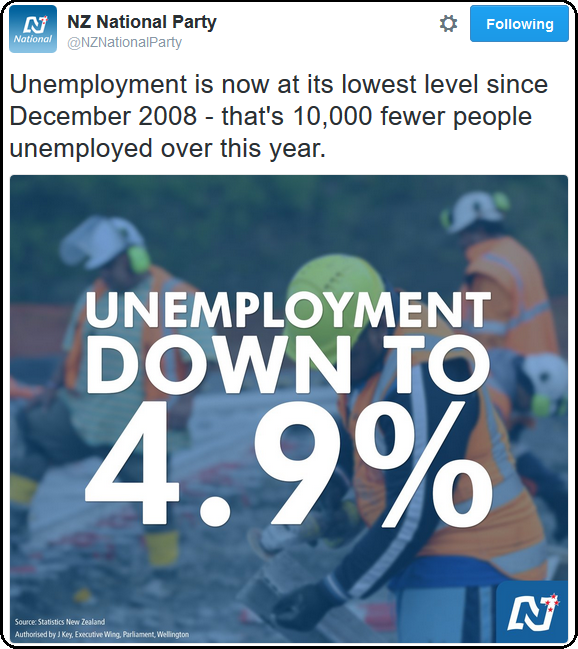
.
And three days later;
.
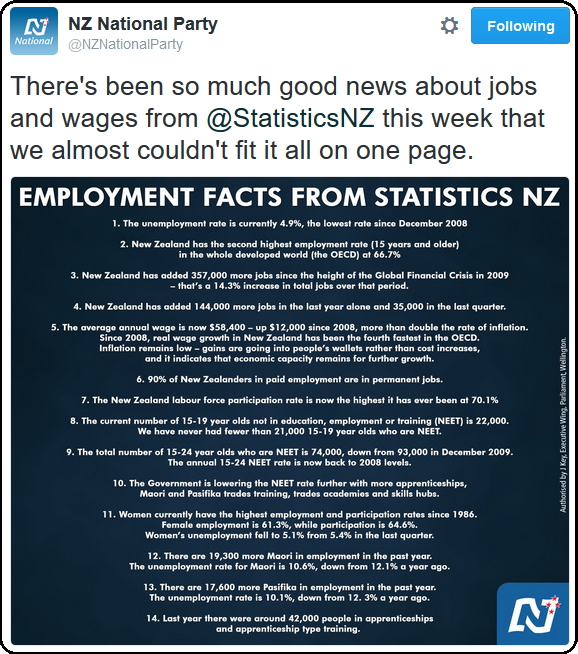
.
It’s all nonsense, of course – made worse by Statistics NZ’s other dodgy criteria used when considering their definition what constitutes being “employed”;
Employed: people in the working-age population who, during the reference week, did one of the following:
- worked for one hour or more for pay or profit in the context of an employee/employer relationship or self-employment
- worked without pay for one hour or more in work which contributed directly to the operation of a farm, business, or professional practice owned or operated by a relative
Statistics NZ’s mis-representation of our “low unemployment” environment has gone largely unnoticed and unchallenged. No one in the mainstream media has picked up on the questionable data;
This meant the size of the labour force rose 33,000 and unemployment fell by just 3,000 to 128,000. The unemployment rate fell to 4.9% from a revised 5.0% in the June quarter. This was the lowest unemployment rate since the December quarter of 2008. Unemployment has fallen by 7,000 over the last year and is up 1,000 from two years ago. – Interest.co.nz
Unemployment has fallen below 5 percent for the first time in nearly eight years thanks to the growing economy, but it is still not translating into booming wages. Official figures show the unemployment rate declined to 4.9 percent in the three months to September, or 128,000 people, the lowest rate since December 2008. – Radio NZ
According to Statistics New Zealand, the unemployment rate fell to 4.9% in the September 2016 quarter. This is the lowest unemployment rate since the December 2008 quarter. There were 3,000 fewer people unemployed than in the June 2016 quarter and 10,000 fewer over the year. – Maori TV
The unemployment rate has fallen to 4.9 percent for the September 2016 quarter, according to new figures from Statistics NZ. That’s the lowest it’s been since December 2008. – TV3 News
New Zealand’s unemployment rate fell below 5 percent for the first time since December 2008 as employers took on more staff than expected, although that didn’t spur wages to rise at a faster pace. The kiwi dollar rose on the figures. The unemployment rate fell to 4.9 percent in the three months ended Sept. 30 from a revised 5 percent rate in June, Statistics New Zealand said. – Sharechat
New Zealand has recorded its best unemployment rate in almost eight years with third quarter figures falling to a better than expected 4.9 per cent. The jobless rate declined from a revised 5.0 per cent in the June quarter, according to Stats NZ, taking it to its lowest point since December 2008. – NZCity/NZ News
New Zealand’s unemployment rate fell below 5 per cent for the first time since December 2008 as employers took on more staff than expected, although that didn’t spur wages to rise at a faster pace. The kiwi dollar rose on the figures.
The unemployment rate fell to 4.9 per cent in the three months ended September 30 from a revised 5 per cent rate in June, Statistics New Zealand said. – NZ Herald
New Zealand’s unemployment rate fell more than expected in the third quarter to drop to 4.9 per cent – the lowest rate since last 2008. The jobless rate declined from a revised 5.0 per cent in the June quarter, according to Stats NZ taking it to its lowest point since the December quarter nearly eight years ago. There were 3,000 fewer people unemployed than in the previous quarter and 10,000 fewer over the year. – TVNZ News
Of course there were “3,000 fewer people unemployed than in the previous quarter and 10,000 fewer over the year“! Ten thousand unemployed people vanished from the data, at the click of a mouse, as Statistics NZ worked their “magic”.
Statistics NZ could potentially make unemployment vanish entirely, overnight, by changing the unemployment criteria to people with only two hearts and scaly blue skin.
Only Hamish Rutherford, at Fairfax media, pointed out the questionable value of Statistics NZ’s data;
Unemployment has fallen to the lowest level in almost eight years, as the economy creates more than 10,000 new jobs a month. Official figures show the unemployment rate dropped to 4.9 per cent in the the September quarter, the first time it has fallen below 5 per cent since December 2008.
Earlier this year Statistics New Zealand revised the way it conducts the quarterly household labour force survey (HLFS), in a bid to bring the survey more in line with international standards. However the changes mean Statistics New Zealand cannot make confident comparisons with all of the figures from previous surveys.
But even in Rutherford’s article, the all-important point of dodgy stats was lost amongst the ‘rah-rah‘ of the mythical drop in unemployment.
The Otago Daily Times made an even less impressive, passing, reference to Statistics NZ’s fudged figures;
Unemployment in New Zealand is at its lowest level since 2008 but there will be lingering concerns about the lack of wage growth and the impact this will have on the inflation outlook.
Statistics New Zealand has changed some of its survey data to measure unemployment and employment and those changes are still bedding in. – Otago Daily Times
Government Statistician, Liz MacPherson, has rejected any suggestion of political partisanship in the way unemployment data is now being presented.
.

.
She was defensive in the face of criticism from Labour’s Grant Robertson and on 16 August, Ms MacPherson stated;
Like my predecessors I am fiercely protective of the statutory independence of the role of the Government Statistician and strongly refute any assertions made by Grant Robertson that there has been political interference in the production of official statistics.
This independence means that I maintain the right to make changes necessary to ensure the relevance and quality of our official statistics. Changes to the Household Labour Force Survey have been made to ensure that we produce the best possible measure of the current state of the labour market and to maintain consistency with international best practice.
Far from ignoring technological change during the past 30 years, such as the advent of the internet, we are incorporating these changes so as to be technology neutral.
Within the survey questions, to be regarded as actively looking for a job you must do more than simply look at job advertisements, whether it is online or in a newspaper.
It is not uncommon for revisions to be made to official statistics as a result of more accurate information becoming available or changes to international standards and frameworks.
In addition we are introducing new measures – for example underutilisation – enabling a deeper, richer understanding of New Zealand’s labour market.
When this does occur it is standard practice for Statistics NZ to communicate reasons for revisions and anticipated changes well in advance of their official release, as we did on 29 June 2016. […]
Statistics NZ has a legislative obligation to release objective official statistics. We will continue to do this at all times.
One of many ironies not lost on this blogger is that other government departments extoll the virtues of jobseeking on-line. As CareersNZ and WINZ state the blindingly-obvious, “most job vacancies are listed online”;
.

.
WINZ;
.

.
Ms MacPherson’s assertion that Statistics NZ has changed it’s definitions of unemployment and jobseeking “to maintain consistency with international best practice” is not an acceptable explanation.
If “international best practice” does not recognise on-line jobseeking as constituting a definition of unemployment – then that in itself is worrying and suggests that global unemployment may be much, much higher than current international statistics portray.
As a consequence of Ms MacPherson’s decision to exclude on-line jobseekers from official stats, this blogger concludes that official unemployment data is severely flawed and unrepresentative of our real unemployment numbers.
In simple terms; the numbers are a sham.
Unemployment statistics will no longer be presented in on-going up-dates of the Jobless Tally.
.
.
This Statement has not been endorsed by MiniTruth (formerly StatsNZ)
.

.
.
.
Addendum1: Definition of Employment
Employed: people in the working-age population who, during the reference week, did one of the following:
-
worked for one hour or more for pay or profit in the context of an employee/employer relationship or self-employment
-
worked without pay for one hour or more in work which contributed directly to the operation of a farm, business, or professional practice owned or operated by a relative
-
had a job but were not at work due to: own illness or injury, personal or family responsibilities, bad weather or mechanical breakdown, direct involvement in an industrial dispute, or leave or holiday.
.
.
.
References
Statistics NZ: Household Labour Force Survey – Revisions to labour market estimates
Scoop media: On The Nation – Patrick Gower interviews John Key
Interest.co.nz: Key deflects calls for migration review; says migration needed with 5.2% unemployment
Scoop media: Parliament – Questions & Answers – 11 August 2016
Statistics NZ: Labour Market Statistics – September 2016 quarter
Statistics NZ: Labour Market Statistics – June 2016 quarter
Twitter: National (2 Nov)
Twitter: National (5 Nov)
Interest.co.nz: Jobs grew 35,000 or 1.4% in Sept quarter, but unemployment fell just 3,000 and jobless rate falls to 4.9%
Radio NZ: Unemployment drops to lowest level since 2008
Maori TV: Work force grows despite youth unemployment
TV3 News: Unemployment drops to lowest rate since 2008
Sharechat: NZ jobless rate falls below 5% for first time since 2008, wage inflation muted
NZCity/NZ News: Jobless rate falls to near eight-year low
NZ Herald: NZ jobless rate falls below 5 per cent for first time since 2008, wage inflation muted
TVNZ News: Unemployment rate falls to near eight-year low
Fairfax media: Unemployment drops to lowest level since 2008 on booming job creation
Otago Daily Times: Unemployment lowest in eight years
Radio NZ: Statistician denies political interference over job seeker figures
Statistics NZ: Government Statistician responds to Grant Robertson
Careersnz: Job hunting tips
Work and Income: Where to look
Additional
TVNZ: Q+A – Interview with John Key
Previous related blogpost
Lies, Damned lies and Statistical Lies
National exploits fudged Statistics NZ unemployment figures
Lies, Damned lies and Statistical Lies – ** UPDATE **
.
To be periodically up-dated.
.
.
.
.
This blogpost was first published on The Daily Blog on 9 November 2016.
.
= fs =
Trumpwatch: Black Ops from the SIS and FBI?
.

.
Two days ago (28 October), FBI Director, James B. Comey, sent a letter to the US Congress disclosing that the Bureau was investigating newly-discovered emails from disgraced former US Congressman, Anthony Weiner.
.

FBI Director James B. Comey
.
The new material “appeared relevant” to the Hillary Clinton private-server/email case, according to Comey. In an explanatory email to FBI employees, Comey wrote;
“This morning I sent a letter to Congress in connection with the Secretary Clinton email investigation. Yesterday, the investigative team briefed me on their recommendation with respect to seeking access to emails that have recently been found in an unrelated case. Because those emails appear to be pertinent to our investigation, I agreed that we should take appropriate steps to obtain and review them.
Of course, we don’t ordinarily tell Congress about ongoing investigations, but here I feel an obligation to do so given that I testified repeatedly in recent months that our investigation was completed. I also think it would be misleading to the American people were we not to supplement the record. At the same time, however, given that we don’t know the significance of this newly discovered collection of emails, I don’t want to create a misleading impression. In trying to strike that balance, in a brief letter and in the middle of an election season, there is significant risk of being misunderstood, but I wanted you to hear directly from me about it.”
The political version of an atomic-bombshell came eleven days before the US Presidential Election (early voting in several states notwithstanding) on 8 November.
Interestingly, Comey himself admitted;
“Of course, we don’t ordinarily tell Congress about ongoing investigations…”
Comey tried to justify his disclosure to Congress;
“I also think it would be misleading to the American people were we not to supplement the record…”
But in his rambling note, he then revealed;
“…however, given that we don’t know the significance of this newly discovered collection of emails…”
And then pointed out the blindingly obvious;
“I don’t want to create a misleading impression…”
Director Comey had already created “a misleading impression“. By publicly announcing the “re-opening” of the investigation and referencing a “connection with the Secretary Clinton email investigation“, irreparable damage had been done to Clinton’s campaign and Trump’s presidential chances suddenly took on new life.
As former Attorney General, Eric Holder, pointed out;
“Justice Department officials are instructed to refrain from commenting publicly on the existence, let alone the substance, of pending investigative matters, except in exceptional circumstances and with explicit approval from the Department of Justice officials responsible for ultimate supervision of the matter,” the letter says.
They are also instructed to exercise heightened restraint near the time of a primary or general election because, as official guidance from the Department instructs, public comment on a pending investigative matter may affect the electoral process and create the appearance of political interference in the fair administration of justice.”
Current US Attorney General, Loretta Lynch, also opposed Comey’s decision to formally write to Congress;
Lynch expressed her preference that Comey follow the department’s longstanding practice of not commenting on ongoing investigations, and not taking any action that could influence the outcome of an election, but he said that he felt compelled to do otherwise.
The response from both Republicans and Democrats has been unrestrained anger. Senate minority leader Harry Reid was unequivocal in condemning Comey’s behaviour;
“Your actions in recent months have demonstrated a disturbing double standard for the treatment of sensitive information, with what appears to be a clear intent to aid one political party over another.
My office has determined that these actions may violate the Hatch Act, which bars FBI officials from using their official authority to influence an election. Through your partisan action, you may have broken the law.”
What is even more startling is that at the time that Comey made his disclosure to Congress (28 October), it was not until two days later that the FBI obtained a warrant to actually look at the emails on Weiner’s computer.
So on what basis did Comey feel the need to advise Congress?
When Comey sent that letter, he had no way of knowing what the emails contained. For all he knew, they could have been recipes for apple pie.
In which case, Comey has single-handedly interfered in an election process by using the power of his position.
Which would be an abuse of power.
Which would be a situation that we here in New Zealand would be intimately familiar with;
.

.
As the NBR reported over this incident in November 2014;
Security Intelligence Service director Rebecca Kitteridge has made a formal apology to former Labour leader Phil Goff for the way in which the SIS released “incomplete, misleading and inaccurate information” in response to an OIA request from Whale Oil Blogger Cameron Slater.
In 2011 Mr Goff said he hadn’t been briefed about alleged Israel spies being caught in the Christchurch earthquake earlier that year, a contention Prime Minister John Key and then-SIS director Warren Tucker disputed.
Dr Tucker’s briefing notes were declassified, then swiftly released to Mr Slater after he requested them under the Official Information Act.
The notes appeared to confirm Mr Goff had been briefed on the matter but Ms Gwyn’s investigation has established this was not the case.
The apology to Mr Goff is one of the recommendations in the report of inspector-general of intelligence and security Cheryl Gwyn, which stated “These errors resulted in the misplaced criticism of the then leader of the Opposition, Phil Goff. Phil Goff is owed a formal apology by the Service.”
Although Ms Gwyn found no evidence of political partisanship by the SIS, its actions did have a politically partisan effect and she found the agency had failed to take adequate steps to maintain political neutrality.
The NZ Herald reported;
Prime Minister John Key is “in denial” over a report which backs Dirty Politics allegations his staff used information from the SIS to orchestrate a smear campaign against former Labour leader Phil Goff, the Opposition says.
Inspector General of Security Intelligence Cheryl Gwyn’s report yesterday found primarily that former SIS director Warren Tucker was at fault for supplying “misleading” information about Mr Goff to the Prime Minister during a 2011 war of words between the pair.
Mr Goff claimed he had not been briefed by Dr Tucker about suspected Israeli agents in Christchurch at the time of the earthquakes earlier that year. However, based on the information supplied by Dr Tucker, Mr Key said he had been briefed.
The report found Mr Key’s former senior communications adviser Jason Ede helped attack blogger Cameron Slater obtain that misleading information from the SIS which Slater then used to embarrass Mr Goff in blog posts.
[…]
Ms Gwyn’s report said the information supplied by Dr Tucker about the briefing was “incomplete, inaccurate and misleading” and “resulted in misplaced criticism” of Mr Goff. It also found that after learning of the information, Mr Key’s deputy chief of staff and primary point of contact with the SIS, Phil de Joux, suggested to Mr Ede the information “might prompt an OIA request”.
Mr Ede then gave that information to Slater, discussed how an Official Information Act request should be worded, and provided Slater with draft blog posts attacking Mr Goff.
Ms Gwyn’s inquiry found Mr Ede was on the phone to Slater when Slater emailed his OIA request to the SIS.
Patrick Gower from TV3 was his usual ‘delicate’ self when he expressed his assessment of the politicisation of the NZSIS by the National government;
3 News understands the spy agency and Prime Minister John Key’s office were found to be in cahoots with Slater to get the information out.
It was sensitive information that embarrassed Mr Goff, pertaining to the issue of supposed Israeli spies Mr Goff said he didn’t know about, though he had been briefed about it.
The report deals with how the information got out, and that is through former SIS director Warren Tucker. Mr Tucker is found have been unfair and politically partisan in the way he dealt with the Prime Minister’s office to get it out, according to 3 News’ understanding of the report.
Then-head of the SIS, Warren Tucker, used his position to embarrass the Leader of the the Labour Party, just months out from the 2011 General Election. It was done with the full knowledge of members of John Key’s staff. Our esteemed Dear Leader was probably fully aware of the plot.
No wonder the Comey Affair seemed so hauntingly familiar when news of it broke.
Because FBI Director Comey has his own political affiliations;
.

.
Even though he has been a registered Republican for most of his adult life, FBI Director James Comey testified Thursday that he is no longer a registered member of the GOP.
“Although our politics are different — I gather you’re a Republican — that correct?” Rep. Gerry Connolly (D-Va.) asked Comey in prefacing his remarks.
Comey responded, “I have been a registered Republican for most of my adult life, not registered any longer.”
The FBI director, who previously served as deputy attorney general in George W. Bush’s administration before President Barack Obama appointed him to his current position, donated to the presidential campaigns of John McCain in 2008 and Mitt Romney in 2012.
Mr Comey – meet Mr Warren Tucker.
You two would appear to have a bit in common.
.
.
.
References
Washington Post: Read the letter Comey sent to FBI employees explaining his controversial decision on the Clinton email investigation
Wikipedia: Anthony Weiner
Politico: Polls show battleground map tightening
The Hill: Holder, ex-Justice officials question Comey’s ‘breach of protocol’
The New Yorker: James Comey Broke with Loretta Lynch and Justice Department Tradition
The Guardian: Clinton emails inquiry – FBI gets warrant as Comey told he may have broken law
NBR: SIS report equals egg all over Key’s face – Goff
NZ Herald: Dirty Politics – John Key ‘in denial’ over SIS report
TV3: SIS to say sorry for Whale Oil OIA release
Politico: FBI director says he’s no longer a registered Republican
Additional
Radio NZ: Phil Goff receives apology from SIS over release of information to Whaleoil
Other Blogs
The Standard: Timeline – Key responsible for SIS release
Wheeler’s Corner: SIS Forced to Apologise to Phil Goff says leaked report
The Pundit: John Key – The buck doesn’t stop with me
.
.
.

.
This blogpost was first published on The Daily Blog on 1 November 2016.
.
.
= fs =

